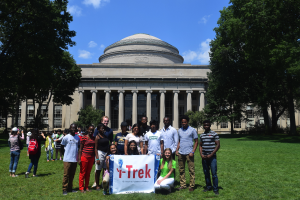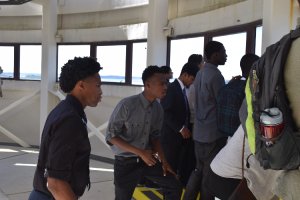- 20 Jan, 16
- by niaja
- in Newsletter, Trekkers
-
 0
0
-

 0
0
2015 Orientation
By: Tim Wright

On August 2nd, fifteen students embarked on the first Trek Orientation, a program for traditionally underserved or underrepresented students pursuing majors in STEM fields, such as science and
mathematics. The program, which is rooted in a mentorship process involving graduate students and i-Trek staff, took place on the MIT campus, with
a stop at the Harvard Campus as well, and is the precursor to the Trek program. The program included Mentor Research Presentations, a Hackathon, attending a poster presentation by MIT students, and completing a group research project (culminating in a presentation by each group). A prize was awarded to the highest scoring group. The Trek Orientation engages critical, analytical, and creative thinking skills for all participants, which will help prepare them to succeed in college, graduate school, and beyond.
First, a group of graduate students gave presentations on their graduate research projects. Based on those presentations, the students provided their input on whom they would like as their mentor for the Trek process. Based on their feedback, a mentor is selected for the students participating in the Orientation and subsequently the Trek.
After the students  had a mentor, the next stage was the Hackathon. The students were divided into groups, and presented with a problem that requires a scientific research project to solve. The competition involved the different groups coming up with the best scientific research project to solve the problem.
had a mentor, the next stage was the Hackathon. The students were divided into groups, and presented with a problem that requires a scientific research project to solve. The competition involved the different groups coming up with the best scientific research project to solve the problem.
The students are then able to draw inspiration and knowledge by viewing presentations by MIT students at the Poster Presentation by the MIT Summer Research Program. The Trek students view these presentations in order to gain ideas for their own research project.
Each group decides on a research project, which will be conducted over a period of several weeks. At the conclusion of the Orientation, each group gave a presentation explaining the project they propose to conduct. A prize was awarded to the group with the best presentation. At the conclusion of the one week Orientation, the cohort embark on the project defined, otherwise known as their “Trek.” The project is different each year and takes students to different locations.
The process opens up students’ minds to new ideas of objective analysis. They will be open to new ways of measuring and observing the world around them. They become well versed and experienced in scientific and mathematical research, which will not only give them a better chance to succeed in graduate school, but also in their future endeavors in life.
Balls Bouncing Off the Walls
i-Trek Volunteer Karen
Make sure to support i-Trek…
- with a donation
- with your time
- with sponsorship